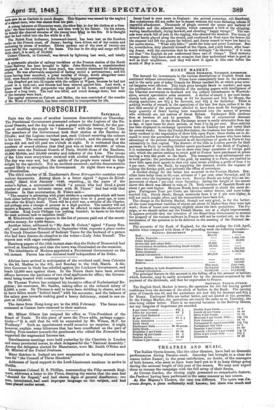Mr. Milner Gibson has resigned his office as Vice-President of
the Board of Trade. To this piece of news the Times adds, perhaps sugges- tively—" It is said that he will be succeeded by Mr. Wilson, M.P. for Westbury." Such an appointment would occasion no surprise; it might however, explain some bitterness that has been manifested on the part of leading Free-traders towards the gentleman who edited the Economist but supported the augmented Income-tax.
Simultaneous meetings were held yesterday by the Chartists in London and many provincial towns, to elect delegates for the "National Assembly." Among the delegates elected for Manchester, were Mr. Smith O'Brien and Mr. Mitchel of the United Irishman.
Many districts in Ireland are now enumerated as having elected mem- bers for " the Council of Three Hundred."
Addresses of loyal support to the Lord-Lieutenant continue to arrive in Dublin.
Lieutenant-Colonel H. S. Phillips, commanding the Fifty-seventh Regi- ment, addresses a letter to the Times, denying the stories that the men had "shouted for Repeal," and had shown signs of general disaffection : two men, intoxicated, had used improper language on the subject, and had been placed under arrest. Jenny Lind is once more in England: she arrived yesterday, eici Hamburg. Her countrymen did not suffer her to depart without the most flattering tokens of regretful attachment. Thousands of people covered the quays and harbour of Stockholm and the adjacent heights, which command a view of the shipping, waving handkerchiefs, crying farewell, and shouting " happy voyage!" The ves- sels were stuck full of men in the rigging, who cheered the steamer. The music of several bands played along the strand, and continued to float upon the breeze till the steamer had left the gazers far behind, and Jenny ceased to wave her band to her native shores. " What silly folks !" quoth the busy and grave Londoner. But he, nevertheless, duly planteth himself at the Opera, and goeth home, after hear- ing Jenny, with the conviction that he would willingly "do likewise," if it were not that " the English do not understand these sort of things." Their modesty wrongs them: they have shown on occasion that they understand what is good as well as their neighbours; and they will show it again in this case before the month of May is over.


























 Previous page
Previous page